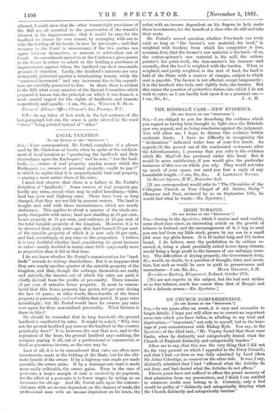LOCAL TAXATION.
[To THE EDITOR OF THE "SPECTATOR."]
SIR,—Your correspondent, Mr. Portal, complains of a phrase used by Mr. Gladstone at Leeds, when he spoke of the readjust- ment of local taxation as "quartering the landlords and their descendants upon the Exchequer ;" and he asks, "Are the land- lords, i.e., owners of real property, paying money which the Exchequer, i.e., owners of personal property, ought to pay ?" to which he replies that it is unquestionable that real property is paying a most unfair share of the rates.
I must first observe that there is a fallacy in Mr. Portal's definition of "landlords." Some owners of real property pay hardly any rates, except what may be called hereditary,—tithe, land tax, poor and highway rates. These have been so long charged, that they are not felt by present owners. The land is bought and sold with these incumbrances, which are nearly stationary. This applies to about a quarter of the whole pro- perty chargeable with rates; land now standing at 26 per cent., house property at 51 per cent., and railways. at 23 per cent, of the total rateable property of the kingdom. Moreover, it is to be observed that, sixty years ago, this land formed 70 per cent. of the rateable property of which it is now only 26 per cent., and had, accordingly, to pay rates in like proportion. I believe it is very doubtful whether land, considering its great increase in value—nearly doubled in rental since 1834—pays really more in proportion than it did at that time.
I do not know whether Mr. Portal's commiseration for "land- lords" extends to railway shareholders. But it so happens that they own nearly another quarter of the rateable property of the kingdom, and that, though the railways themselves are realty and rateable, the income, out of which the rates are paid, is -chiefly derived from the profits of personalty. There remains 51 per cent. of rateable house property. It must be remem- bered that this house property has grown 400 per cent, during the last 60 years ; in other words, three-fourths of the house property is personalty, realised within that period. It pays rates accordingly ; but Mr. Portal would have its owners pay rates over again for their non-realised personalty. What fairness is there in this P He should be reminded that in long leaseholds the ground landlord is unaffected by rates. It might be asked, "Why does not the ground landlord pay rates as the landlord in the country practically does ?" It is, however, the case that now, and to the expiration of the lease, the ground landlord pays nothing, the occupier paying it all, out of a professional or commercial, or fixed or precarious income, as the case may be.
Last of all, it is to be remembered that rates are often mere investments, made at the bidding of the State, but for the ulti- mate benefit of the owner. If by a highway-rate roads are made passable, the owner gains. If by a drainage-rate land is made more easily cultivable, the owner gains. Even in the case of poor-rate, a larger margin of rent is secured by its payment, for the effect of a poor-rate is to lower wages, by acting as an insurance for old age. And Mr. Portal calls upon the commer- cial man with an income dependent on the chances of trade, the professional man with an income dependent on his brain, the artist with an income dependent on his fingers, to help make these investments, for the benefit of a class who sit still and take their rents.
Mr. Portal's second question, whether Free-trade can truly exist so long as "the farmer's raw material, his land," is weighted with burdens from which his competitor is free, assumes, first, that the farmer's raw material is his land,—if so, the cotton-spinner's raw material is his mill, the cotton- printer's his print-work, the iron-master's his furnace—and secondly, that the land is weighted with the burden. What is weighted, and justly weighted, is the rent of land, for land is held of the State with a reserve of charges, subject to which rent is payable. The farmer is not affected, except temporarily ; it is the landlord who feels, and rightly feels, the burden. But this raises the question of protective duties, into which I do not wish to enter, as I can hardly look upon it as a practical one.—


































 Previous page
Previous page